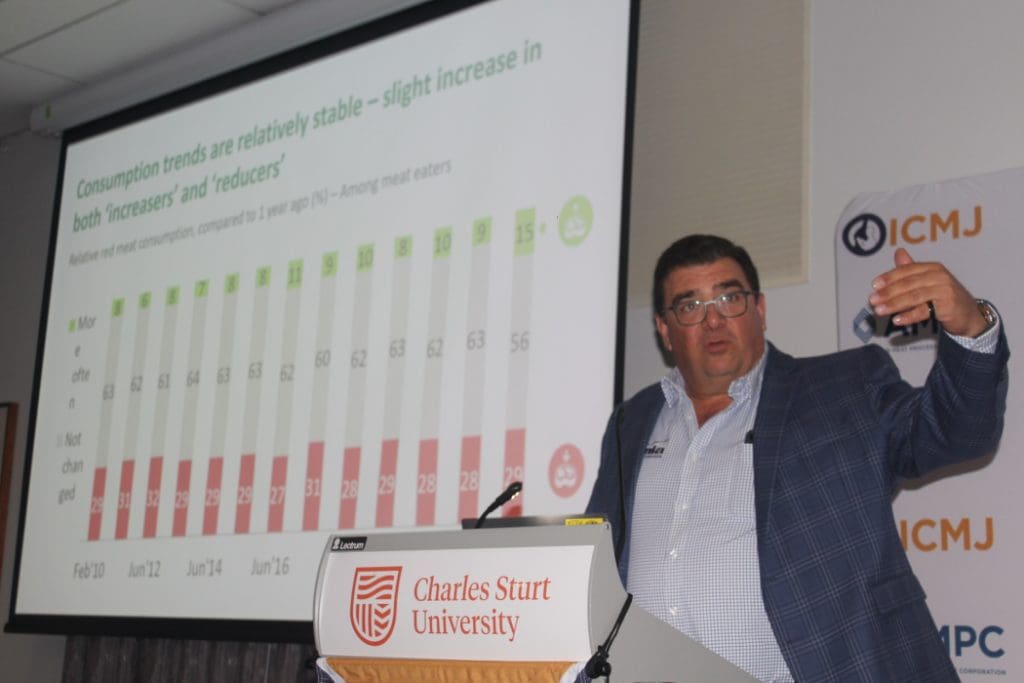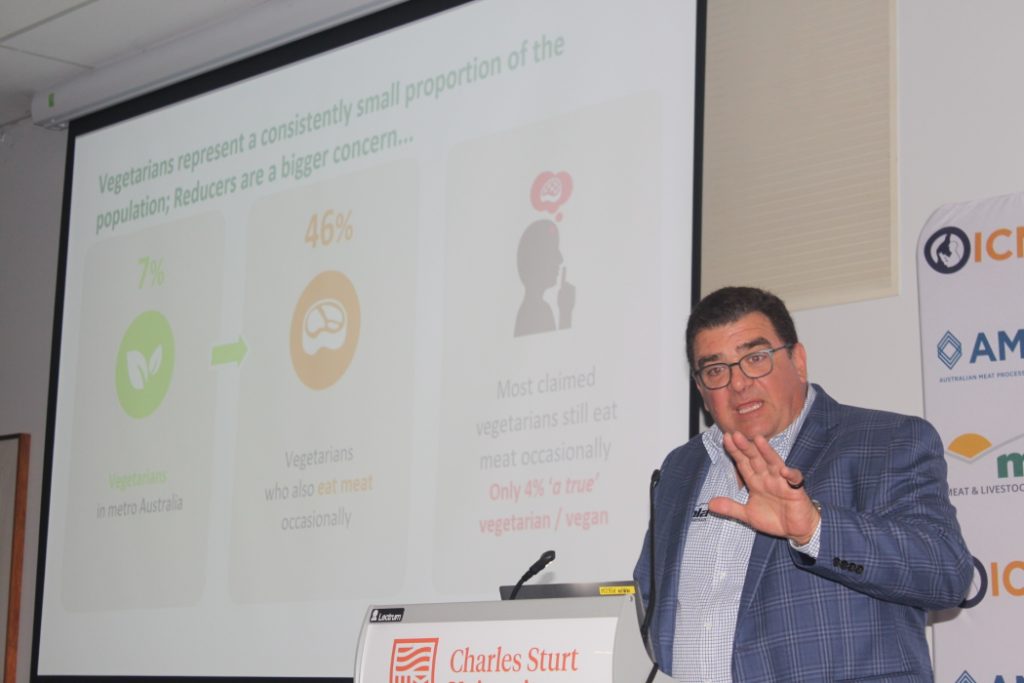
MLA managing director Jason Strong makes a point on red meat consumption.
AUSTRALIA’S red meat industry needed to stop talking about the potential for cattle exports to be banned as a consequence of the proposed phase-out of the live sheep trade, Meat & Livestock managing director Jason Strong said yesterday.
Mr Strong told participants at the Intercollegiate Meat Judging Association’s 2023 conference in Wagga Wagga that the industry’s own negative voices had to stop.
In his presentation, the MLA leader outlined his views and the evidence around vegans and vegetarians on the domestic market, how to respond to red meat critics and how not to contest Minister for Agriculture, Fisheries and Forestry Murray Watt as he oversees the live sheep by sea trade phaseout.
Answering an ICMJ student’s question, Mr Strong said the biggest hurdle the red meat industry faced in the near future related to how it told its story.
“So often the negative views of our industry come from us.”
Mr Strong then effectively contested a major plank in the live export and sheep industries’ platform in opposing the proposed phasing out of live sheep exports by sea; the parallel discussion around the potential for live cattle exports to also be banned.
“The only people raising that are the cattle industry … ‘like well they are doing this and they’re going to do it to cattle’,” Mr Strong said.
“The Minister keeps saying ‘no, no, we’re not’ … ‘aah but you’re doing this and you’re going to do it to cattle’ and the minister says’ no, we’re not’.
Mr Strong said if the cattle industry is “not careful” the minister might react to all the criticism and “do it anyway.”
“We’ve got to be careful that we… no, I’ll be strong, we’ve got to stop being the negative voice in our industry.
“There is so much positive in what we do and so much goodwill that we have with the consumers in our community .. mostly they are just looking for reasons to keep doing what they like doing..”
‘Massively oversensitive to criticism’
Mr Strong said red meat industry participants are “massively oversensitive to criticism” and need to stop being a negative voice in agriculture.
He said MLA’s longitudinal studies on consumer sentiment around red meat were consistently positive, regardless what is heard or read in the media.
“It’s the noisy minority and it’s hard not to be offended by that and it’s hard not to get up in arms about it.”
Mr Strong said when he chaired the Australian-USDA Industry Taskforce a producer made a nasty derogatory comment about him on social media and he wanted to “get stuck into him.”
But his social media team told him the producer only influenced 211 people and advised that the worst thing Mr Strong could do would be to “say anything.”
“As soon as you actually connect into the conversation you actually give them more access and positioning than they could ever possibly imagine getting themselves.
“So their very sophisticated advice was to go outside stomp around for a while and come back inside and get on with it – and that’s part of what we’ve got to do as an industry,” Mr Strong said.
He said since 2010, a consistent 28-29 percent of domestic consumers surveyed each year said they were thinking about lowering their consumption of red meat, mainly because of prices that were nearly 2.5 times more than 20 years ago.
More interesting, was the percentage of people looking to increase their consumption that fluctuated, but was rising, from 8pc in 2021 to 15pc in 2022.
But Mr Strong said all the industry heard were “the negative bits” applied to red meat, while there were actually more people increasing consumption than has ever been seen before.
“The reasons why they are looking at increasing their consumption is because it is good for, with lots of iron and zinc …. and one of the things that has come out recently is it is actually convenient from a food preparation point of view, which we have never considered previously.”
With the advent of the TV food and cooking shows such as Master Chef, consumers’ willingness to cook and their connection to the kitchen has changed “and now red meat is seen as one of the things people like working with.”
“So it is quite different to what we often hear in the commentary.”
Don’t give vegetarianism promotion or exposure

Vegetarians represent a consistently small proportion of the population….
And interestingly with veganism and vegetarianism, Mr Strong said over the period of the longitudinal studies the number of vegans and vegetarians in Australia has consistently not shifted from about 7pc from 2010. He said each year between 15-18pc of survey respondents try vegetarianism and then come back to being a red meat eater.
“But the really funny thing is that half of them (46pc) still eat red meat, but they identify as vegans or vegetarians …. so kind of the worst thing we can do is give them the promotion or exposure …”
Mr Strong said MLA had done some work on the plant-based protein market in Australia and found it was about 0.4pc of the protein category.
“The people who purchase that product, they spend less on protein when they purchase, they shop less often and the size of their basket is small.
“The worst thing we can actually do is talk about it – so we’ve got to keep these things in perspective – consumers love what we do, they support what we do, they’re just looking for a reason to keep doing what they like doing.”
Mr Strong said the industry has to be more confident in telling its story, and MLA had invested in material to arm producers to do that, hence the resources on the Good Meat site, the enlisting of influencers to tell a positive story about the red meat sector and ensuring there was a scientific basis behind it.
“It (using influencers) has been really really positive.”
He said red meat industry people talk to themselves “really well”.
“And largely we talk to ourselves and argue about vegans and vegies, whereas we need to be looking outward and telling our story to the people in the broader population.
“What we’ve found is that more often not is not that it’s negative discussion about our industry, it’s that we are actually not participating in the conversation … we are actually not present in the discussion,” he said.
Mr Strong said the industry had to be better at countering the confronting, negative and sometimes offensive commentary, discussion and views, and connecting with the consumers.

Every sheep boat also has some cattle. It would be wise to be wary, because those wise men from the east can magic up a loss of social licence somehow with no proof needed or understanding. Policy made to placate the ignorant. You could whip up a rent-a-crowd to ban mining very quickly. Logging has been banned.
Great comments from Jason Strong on how we all should engage with our consumer friends and followers. We need to listen and think about.